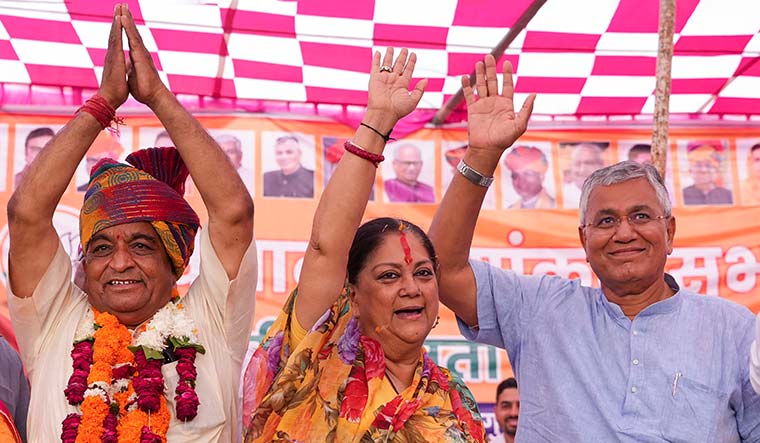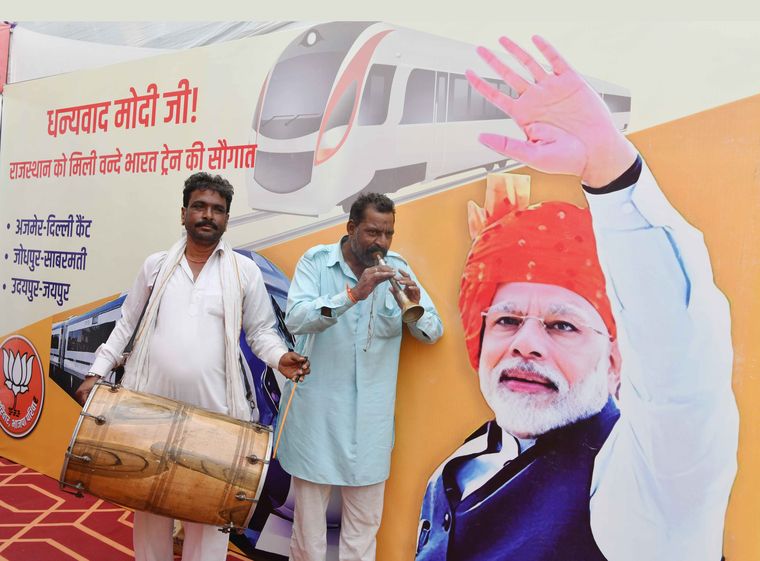The festive season is in full swing in Rajasthan. And it is raining offers, not just from commercial establishments, but also from political parties. Unsurprisingly, the offers from the political parties in the election-bound state are more enticing. The Congress moved early with Chief Minister Ashok Gehlot’s seven guarantees. The BJP is readying its best package and it comes with a guarantee from Prime Minister Narendra Modi himself. So, it is the Gehlot guarantee versus the Modi guarantee, which comes with hindutva enclosed.
Modi has already announced a big guarantee for the country―continuation of free ration for another five years. This is huge for Rajasthan, because the state is home to 4.4 crore beneficiaries of the scheme. This translates to more than 50 per cent of the state’s population. Rajasthan has 5.29 crore voters.
The collective leadership in the state has led to a pool of chief ministerial hopefuls in the BJP, including former chief minister Vasundhara Raje Scindia, Union minister Gajendra Singh Shekhawat, Lok Sabha MP and Jaipur royal Diya Kumari and the leader of opposition Rajendra Rathore. Despite the evident attempt within the party to sideline Raje, she has shown remarkable resilience.
The BJP is bundling the assembly polls with the 2024 Lok Sabha elections so that both have better resonance among voters. “Whom do you want to see elected in 2024,” asked Union Home Minister Amit Shah as he started his Rajasthan assembly campaign.
In the 2018 assembly elections, the party had lost more than 6 per cent vote share (securing 38 per cent) and 90 seats in Rajasthan. But, in the 2019 Lok Sabha polls held five months later, it secured 59 per cent vote share and won 24 out of 25 seats. This time, it will bank heavily on the work done by the Modi regime in the last nine years and the benefits of various schemes which have flowed down to the voters in the state. The BJP promise is ensuring the delivery of every promise made by Modi.
Shekhawat said the Congress government had failed to fulfil its promises and had lost credibility. “The people have seen their corrupt practices, poor law and order, and paper leaks,” he said. “They will be rooted out.” The BJP is promising investigations into the paper leaks, including into the role of the chief minister, apart from probing the issue of alleged kickbacks detailed in the now famous red diary. There is also now a steady stream of leaders joining the BJP, which it says is an indication of things to come.
Though pre-poll surveys have given the BJP an edge, this is likely to be a closely fought election. In 2018, 45 seats were won with a margin of less than 6,000 votes. That is 22.5 per cent of the total 200 seats―enough to be decisive in a close contest. There were 10 seats where the winning margin was below 1,000. The lowest margin was in Asind, which the BJP won by 154 votes. In fact, then state Congress president C.P. Joshi, who was instrumental in the victory (the Congress won 100 seats, while the BJP won 73), had lost by one vote. He was a frontrunner to be chief minister, but had to settle for being the assembly speaker.
In light of such potential close contests, the biggest worry for both the Congress and the BJP are the rebels―more than 30 of them―who are contesting as independent candidates after they were denied tickets. For example Rajpal Singh Shekhawat, who was a Raje loyalist, is contesting from Jhotwara, against Lok Sabha MP and former minister Rajyavardhan Singh Rathore of the BJP and the Congress's Abhishek Choudhary, the state head of the National Students' Union of India. In 2018, Shekhawat, as a BJP candidate, had got over one lakh votes from the seat even as he lost to the Congress candidate by just under 11,000 votes. During the assembly polls in Himachal Pradesh and Karnataka, rebels had spoiled the BJP’s chances in many seats.
In keeping with its social engineering formula, the BJP has given tickets to 33 Jats, 34 dalits, 25 Rajputs, 20 Brahmins, and 11 Vaish and Gurjar candidates each. Ironically, the BJP, which brought the historic women reservation bill, has given tickets only to 20 women, seven less than the Congress.
Also read
- Can the populist push and publicity blitz help Gehlot retain Rajasthan?
- 'BJP has ED; we have seven guarantees': Ashok Gehlot
- 'MLAs and Congress president will decide the CM': Sachin Pilot
- 'People have realised BJP only talks': Rajasthan Congress president
- 'I have very good relations with Vasundhara Raje': Diya Kumari
Women voters are very much in focus in the campaign though. It has highlighted poor law and order and several rapes during the Gehlot regime. “If the Congress government was to come again, women will not be safe to venture out,” said Diya Kumari. “The Gehlot government has failed on all accounts. BJP governments have shown how to maintain law and order.”
The saffron party has also fielded some saffron-clad candidates. They include Baba Balaknath (also a contender to be chief minister), Otaram Dewasi, Balmukund Acharya and Pratap Puri. It is also hitting out at the Congress government for its “appeasement politics” and recounting communal incidents, such as the beheading of tailor Kanhaiya Lal in Udaipur last year.
With the Ayodhya Ram temple opening in January, the party is all set to remind voters of this achievement and invite them to visit it―free visits maybe on the cards as part of its election manifesto.
If elected, the BJP leadership will have a big decision to make―picking the chief minister from the pool of hopefuls. Almost 50 Raje loyalists have got tickets and she continues to be the party's most recognisable face in the state. She has also been campaigning across the state and staying away from controversies.
Ultimately, the chief minister chosen would be the one who can also ensure victory in the Lok Sabha polls.



